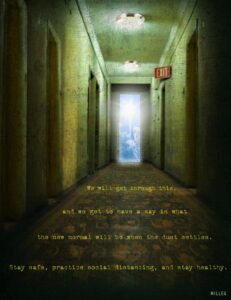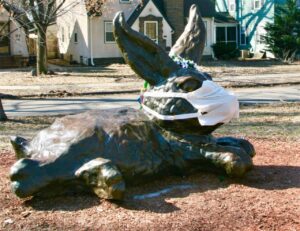
BY ELINA KOLSTAD
Well shit, this is scary. Every day we hear about more cases of the virus in Minnesota. In our community, employees at Seward Co-op’s Franklin store and Mayday Café have tested positive. Museums, schools and retail stores are closed. Grocery stores are still open, but shelves are empty, items are running out. My family are staying in for the time being. My husband is working from home and our daughter is home from daycare.
In all of this we are incredibly privileged. We have health insurance, we are able to work from home, we are under 65 and have no underlying health issues. But we are painfully aware that we will inevitably know people who get this virus, likely getting it ourselves, and I fear we will know at least one person who will die from it. Hopefully we are wrong.
This virus has drastically altered the way that we live. Air travel is collapsing, cities and even countries are shutting down, healthcare systems are being overwhelmed, and people are dying. In many ways this pandemic has highlighted the weaknesses of our system. We need a universal single payer healthcare system. We need better protections for workers, especially independent contractors and tipped workers, so that people have the option to avoid potentially lethal illnesses without risking their financial stability. We need a system that ensures ALL Americans are able to retire at a reasonable age so that they are not faced with having to continue to work customer service jobs such as grocery store cashier even as hordes of people, many of whom are statistically likely to carry the virus, panic-buy toilet paper.
This crisis has brought out the worst in some and the best in others.We have seen the concrete damage that our individualistic, dare I say, selfish culture has reduced some to through panic-buying and supply hoarding. And, on the other end of the spectrum, some are refusing to change their behaviors to limit the spread of the virus.We have seen horrible instances of racism and xenophobia. But we are also seeing many people come together in the U.S. and around the world to help others whether they know them or not.
I hope that this experience will encourage our leaders to reevaluate our priorities as a people.Governor Tim Walz classified grocery store workers as emergency personnel and that provides them with vital benefits such as access to free child care. It also recognizes that these employees have endured the risks of large crowds stocking up and panic-buying, and it also appreciates their vital role in keeping the rest of us fed.
At the federal level, this is an opportunity to drive home the importance of a universal single payer healthcare system in the U.S.
Now is the time to remind our political leaders that measures such as a Universal Basic Income (UBI) will do far more to keep the economy afloat than bailing out banks and corporations.
There has been an encouraging amount of bipartisan talk about something that would be very close to a UBI, but right now it is questionable how long this program might last and there are efforts to limit its scope. Checks should begin to go out to anyone with a social security number as soon as possible and they should continue to go out every month until the threat has passed. To put a means test on any relief would unnecessarily slow the transmission of the money through complicated bureaucratic hurdles. If rich people end up getting checks, it would open up a wonderful opportunity to remind politicians that we are already in desperate need of reforming our tax code, and that the rich and large corporations need to start paying their fair share.
There are a number of ways we can support those impacted by the virus and the resulting shut-downs locally as well. Restaurants are still offering take-out and some have expanded their delivery options, but if you don’t want to take the risk, you can buy a gift certificate. Some restaurants such as Modern Times and Seward Café have set up fundraisers to keep themselves afloat. I would also encourage people to make donations or volunteer with organizations serving the homeless and/or those with food insecurity, such as St Stephens and Second Harvest Heartland.
We will get through this, and we get to have a say in what the new normal will be when the dust settles. Stay safe, practice social distancing, and stay healthy. Oh, and you probably don’t need an entire year’s supply of toilet paper.

























